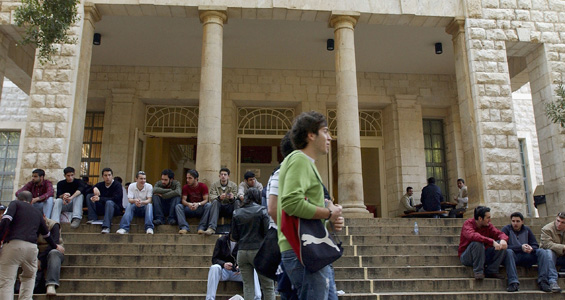Change Lebanon does not believe in
One month after Barack Obama’s US election win, some in Beirut remain indifferent.

 |
| Lebanese students at the American University of Beirut [GALLO/GETTY] |
It has been a month since Barack Obama was elected US president and with six weeks to go until his inauguration, the excitement in the US is quite palpable.
The president-elect continues to make headlines as he begins to outline economic policy and pick known politicians to fill out his cabinet. His latest choices of Clinton-era pundits have created the type of controversy political talk shows crave.
However, in conflict regions of the Middle East, which have been a focus of much of America’s foreign policy in the past five years, the reaction ranges from casual indifference to cautious optimism.
In a four-part series highlighting Middle East reaction one month on, Al Jazeera looks at the Obama factor in Lebanon, Iraq, Syria and the West Bank.
Paul du Quenoy is a professor of history and archaeology at the American University of Beirut (AUB). He describes how Obama has resonated with some in Beirut.
Bustling Beirut
I spent pre-and-post-election season in Beirut but I was immediately struck by how normal the day after Obama’s victory seemed to be.
Nearly a month later, Beirut still seems unaware of or unwilling to ride the euphoria most Americans have felt. From Annapolis to Anchorage, Washington to Wichita, Americans are for the first time able to visualise a tangible change in local politics.
In Beirut, this is a change many Lebanese do not believe in.
Three strikes
In the first week since the election results, I discussed with the concierge in my building the change Obama could bring to the Middle East.
“I don’t think it will make any difference they [US presidents] are just the same,” he replied in rather fair English.
Strike one.
I moved on to the neighbourhood shopkeepers, the closest thing I have to an ‘Arab street’ where I usually buy my milk, bread and tomatoes.
The middle-aged man in button-down shirtsleeves who manages the stores gave me the same shoulder shrug and a perfunctory, non-committal reply of “Yes” or “Obama won”.
Another man who stocks vegetables tepidly said that Obama might be better than the alternative (John McCain) and the current White House occupant (George Bush) but that he could not tell for sure. He politely pretended to wonder what I thought.
Strike two.
I went to my dry cleaner to drop off some shirts. Not bothering to remove the cigarette from his mouth, this Francophone businessman also shrugged out a wistful indifference.
“Oui, il a gagné (yes, he won),” he said, but offered nothing more on whether he thought Obama would be the catalyst of change the Middle East so sorely needs.
On my way back I ran into the guy who installed my home internet service. I brought up the election, but he said he did not follow US domestic politics much less have an opinion to share.
Strike three.
Collegiate indifference
I considered that the AUB campus might be a more thriving environment for debate and discussion on the outcome of the US elections and Obama’s cabinet choices.
After all, it is the premier institution of higher education in the Middle East, and is the alma mater of Fouad Siniora, the Lebanese prime minister, and more than one-third of the new Lebanese cabinet.
Some of my Lebanese colleagues double as high-profile journalists and members of parliament. Many students have lived in the US or have relatives there. Some hold US citizenship and could have voted this year.
Now one month into the post-election period, there are still no avid student conversations, no signs, and not even a hint of excitement in the air.
It has been up to me to mention the election and at almost every juncture I am received with total indifference.
Y-generation
By the end of the second week after Obama won, I decided to push the issue further.
At a world history course which is a required elective in the humanities, I asked everyone if they were aware of the US election results and Obama’s choices (mostly former Clinton administration advisors) for his future cabinet.
Silence.
“Raise your hand if you care,” I entreated them. Three or four out of the 25 students raised their hands.
“Do you think it will make a difference?” I asked, wondering if I would get any decisive answers or articulate explanations, like those of the uncharacteristically energetic Y-generation kids you see on American television.
This was the new generation of young people, I had learned on a trip back to the US in September, who had in large numbers wasted an otherwise perfectly good Friday night at parties devoted to watching the soporific pre-banking crisis debate.
My class of Y-generation Lebanese students moaned a collective “No …” I asked if there were big celebrations in Beirut following Obama’s win.
They just laughed.
I have been asking around in my more advanced courses, too. The only one who thought it would make a difference was the lone American student in Russian History, who seemed to think Obama would be better for health care.
“No difference”
By the third week, post-election, I stopped in at my neighbourhood rotisserie chicken business and tried again. The guy in charge presides over his operation in a surgeon-like white gown and speaks mixed Arabic and English.
I asked what he thought, and he replied: “Not much. Obama is a puppet; McCain is a puppet. It’s like that in every country. Someone like them smiles really big while the same group holds power behind the scenes. It makes no difference.”
That was the most incisive election commentary I have heard all year.
All politics are local
With little over a month to go until Obama’s inauguration, nothing has changed. I have yet to hear any expression of disappointment, fear, hope, or enthusiasm.
I cannot relate with any accuracy what the Lebanese people or my fellow Beirut residents feel to be the most pressing issue confronting the Obama administration.
Those with an interest in politics were naturally more concerned about the national reconciliation talks, which followed the serious civil unrest in May.
Many worry about keeping up with rising inflation in a national economy that has remained solid and even buoyant amid a growing global recession. All politics are local, as Tip O’Neill, the late US Democratic congressman, once said.
I have, however, noticed one slight impression from the election.
In addition to the signs and banners advertising package trips to everywhere from Paris to Singapore, the travel agency closest to campus has a smiling face that eggs its customers on with the slogan “Yes, YOU can!”
I wonder if anyone else gets it.